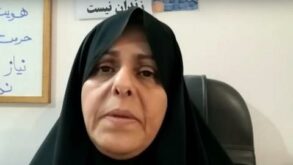CHRI – Two years after being sentenced to long prison sentences without due process in Iran, Iranian American Karan Vafadari and his American permanent resident wife Afarin Neyssari were released on bail from Tehran’s Evin Prison on July 21, 2018.
“In court, they were told to write down their defense,” their son Cyrus Vafadari, who lives in the United States, told the Center for Human Rights in Iran (CHRI).
“They were told that in two weeks they would be either recalled to give further explanations or issued a final verdict,” he added.
The couple is currently in Tehran awaiting a decision on their appeal request. Branch 36 of Iran’s Appeals Court presided by Judge Ahmad Zarger had held an initial session on July 5, 2018, to consider the appeal.
A member of Iran’s persecuted minority Zoroastrian faith, Vafadari had been sentenced to 15 years in prison in early 2018 for several charges including “assembly and collusion against national security,” “spreading corruption,” “storing alcoholic drinks” and “dealing in indecent art.”
Neyssari was sentenced to 10 years in prison under the same charges.
They were both sentenced by Judge Abolqasem Salavati, infamous in Iran for issuing harsh sentences in cases involving politically motivated charges particularly against activists and dual nationals.
The initial sentences of 27 years for Vafadari and 15 for Neyssari that were issued in January 2018 were later reduced at an unknown date.
Vafadari belongs to a prominent Zoroastrian family known for their philanthropy in Iran. Vafadari and Neyssari were running the Aun Art Gallery in Tehran when they were arrested by the Islamic Revolutionary Guard Corps (IRGC) in July 2016.
At the time, Vafadari was actively attempting to reclaim properties confiscated from his family after Iran’s 1979 revolution.
Large institutions controlled by the state that bill themselves as charities began confiscating properties in Iran after the revolution from religious minorities including the Zoroastrian faith. They continue to do so today, especially from Baha’is and Christians.
“Despite the chaos in the early days of the [1979] revolution, and even though my mother spent nine months in the same ward I am being kept in now, our family’s love for the land of our ancestors’ was so strong that they did not leave the country when more than half of our agricultural lands were confiscated in the name of khoms [Islamic tax] and more assets were taken away from us for different reasons,” Vafadari wrote in a letter from prison in January 2018.
In a letter to Supreme Leader Ali Khamenei dated December 2, 2016, Karan Vafadari’s sister, Kateh, noted that the couple had been arrested “to fabricate a case for the purpose of extortion and property seizure.”
 Shabtabnews In this dark night, I have lost my way – Arise from a corner, oh you the star of guidance.
Shabtabnews In this dark night, I have lost my way – Arise from a corner, oh you the star of guidance.


